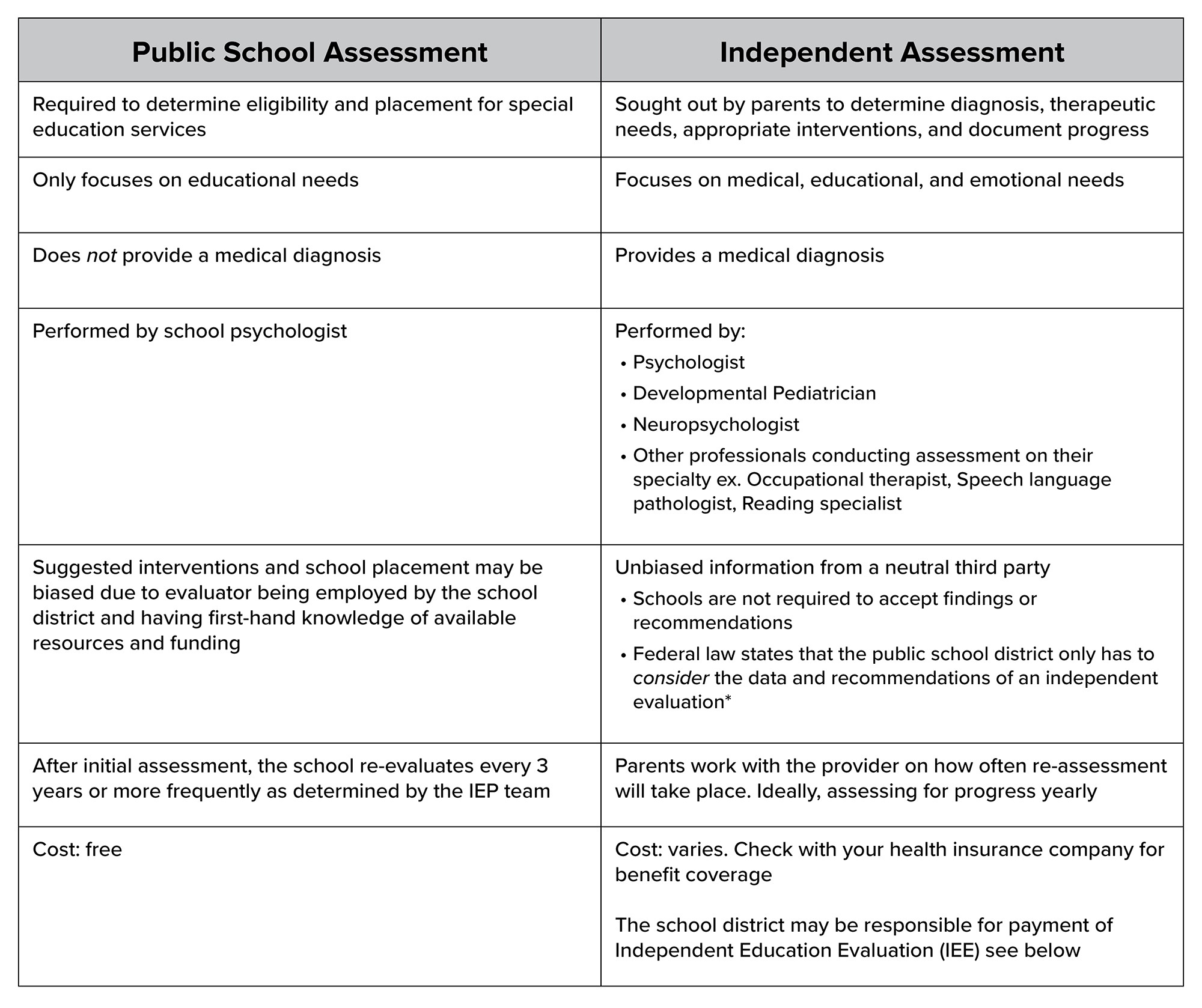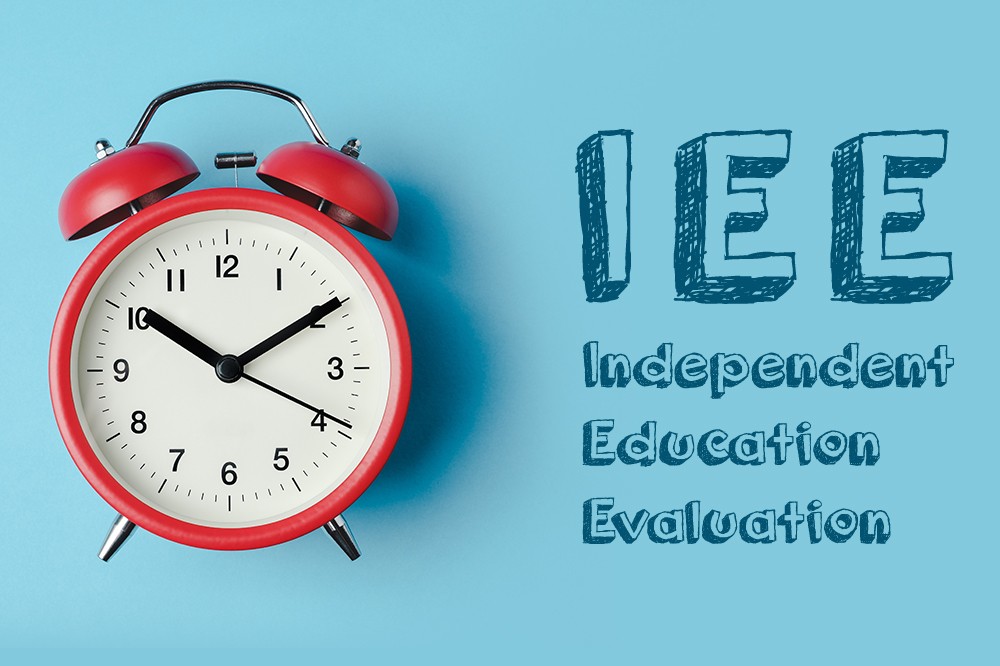Independent Assessments

All contents of this resource were created for informational purposes only and are not intended to be a substitute for professional advice, diagnosis, or treatment. Always seek the advice of your physician, therapist, or other qualified health providers with any questions or concerns you may have.
In order to develop effective goals with your child’s team, you need to know what their strengths and areas of need are. You can determine each by conducting assessments. Assessment is the formal process where professionals analyze data to measure knowledge and skills. While schools perform assessments on a regular basis, there may come a time when you need to seek an independent assessment for a more comprehensive picture.
In this article, you will learn about:
- The different types of assessments
- School vs. independent assessments
- Evaluating progress through assessments
- Responsibilities schools have regarding Individual Education Evaluations (IEE)
Where to Begin

Assessments may evaluate a broad range of skills or be very specific to a skill area. Work with your evaluator to determine the best testing to use for your child. Once the initial assessment is complete, you should have data-driven information to develop educational or therapeutic treatment plans.
Standardized Assessment
- Measures and compares your child to a large group of same age/grade level children.
- Scoring can be confusing. Ask your evaluator to explain the meaning behind the scores.
- Example scoring: a score of 90th percentile means that the individual scored higher than 90% of the same age/grade level reference group.
- Common standardized assessments:
- Autism Diagnostic Observation Schedule (ADOS)
- Childhood Autism Rating Scale (CARS)
- Wechsler Intelligence Scale for Children 5th Edition (WISC-V)
- Kaufman Test of Educational Achievement, 2nd edition (KTEA-II)
- Vineland Adaptive Behavior Scales 2nd edition (Vineland2)
- Sensory Processing Measure (SPM)
Non-Standardized Assessment
- Looks at data, but does not compare scores to other children
- Can be very specific to a skill
- Types of non-standardized assessments:
- Checklists
- Teacher/therapist taken data
- Observations
- Interviews
Public School Assessment Vs. Independent Assessment
Here is a comparison of public school versus independent assessments. Knowing the difference between the two types will help you determine best fit for your child’s needs.

*Information about the federal law which states public schools only have to consider data and recommendations from independent evaluations can be found here.
Evaluating Progress Through Assessments

Now that an educational or therapeutic plan has been carried out, how do you know that it’s working? Conducting annual reviews of previous assessments allows you to compare scores and evaluate progress. This new data gives you and the providers important information on whether any changes need to be made in order to optimize progress.
Annual Review
- Initial assessments provide base-line data on what your child’s present level of performance is at that given time.
- Update them in certain specialty areas on a yearly basis (at least) a yearly basis
- Occupational therapy
- Speech therapy
- Physical therapy
- Behavior therapy
- Individual academic skills such as reading and math skills
- Comparing yearly assessment data allows parents to see progress trends and determine if intervention plans need to be changed.
- Request your child’s provider perform a standardized assessment at any time you feel it is needed to establish rate of progress or if the program is appropriate.
School District Responsibility

Law requires school districts to assess students to determine eligibility and placement in special education services. These are conducted by employees of the school district. However, there are situations when the school district must pay for an assessment to be done by a professional outside of the school district. This is called an Individual Education Evaluation (IEE).
Individual Education Evaluation (IEE)
- The public school system may be responsible for financial payment of an Independent Education Evaluation if:
- The school district cannot perform an evaluation that the IEP teams agrees a student needs.
- The parent disagrees with the school district’s evaluation results.
- If a parent disagrees, the school district may agree to funding an IEE -or- file a due process hearing.
- A due process hearing officer requests an independent assessment
- A neutral third party, with credentials equal to the school district evaluator’s, must conduct the assessment
- The school district may provide the parent with a list of qualified examiners
Conclusion
In summary, while public school assessments are mandatory for establishing special education services, independent evaluations provide a more comprehensive picture of your child’s strengths and needs. Independent assessments give the parents knowledge needed to make decisions on therapeutic and educational interventions.
Recommended Resources
- Wright’s Law Independent Education Evaluations
- Asperger/Autism Network: Guidelines for Neuropsychological Evaluations for Children and Teens
Additional Reading
- Smart IEP Goals
- Therapeutic Interventions
- Special Education: IEP Tips
- TACA Special Education Conflict Resolution: Mediation and Due Process
- Percentile This! (2011 TACA Blog by Lisa Ackerman)




